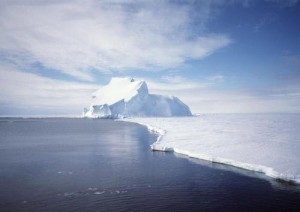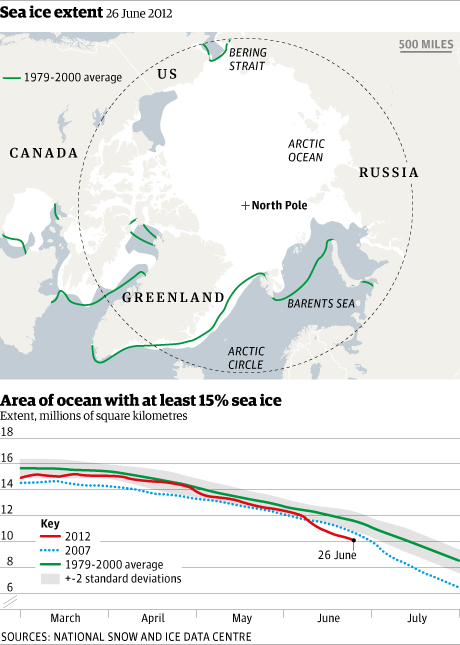Arctic Sea Ice Levels Reach Record Low In June
 Sea ice in the Arctic has melted faster this year than ever recorded before, according to the US government’s National Snow and Ice Data Centre (NSIDC). [Guardian]
Sea ice in the Arctic has melted faster this year than ever recorded before, according to the US government’s National Snow and Ice Data Centre (NSIDC). [Guardian] Satellite observations show the extent of the floating ice that melts and refreezes every year was 318,000 square miles less last week than the same day period in 2007, the year of record low extent, and the lowest observed at this time of year since records began in 1979. Separate observations by University of Washington researchers suggest that the volume of Arctic sea ice is also the smallest ever calculated for this time of year.
Scientists cautioned that it is still early in the “melt season”, but said that the latest observations suggest that the Arctic sea ice cover is continuing to shrink and thin and the pattern of record annual melts seen since 2000 is now well established. Last year saw the second greatest sea ice melt on record, 36% below the average minimum from 1979-2000.

Vice President Joe Biden on Wednesday lashed out at Mitt Romney in Iowa for the second straight day, this time taking issue with the Republican’s reluctance to embrace tax credits for wind and solar energy. [National Journal]
With wind and heat giving it new strength, the furious wildfire that has been burning in the foothills around Colorado’s second-largest city doubled in size by Wednesday, first roaring past containment lines and forcing tens of thousands of residents to flee, chased by billowing smoke, blowing ash and the fear that their homes might be burned to the ground. [New York Times]
Help came from the heavens Wednesday when heavy rains drenched the Flagstaff fire near Boulder, Colo., but officials warned that even days of such weather couldn’t alleviate the bone-dry conditions that have inflicted weeks of wildfires on the West. [Los Angeles Times]
Climate change is likely to alter fire patterns around the world, including a potential increase in the number of fires for much of California in the next 30 years, according to a new study led by UC Berkeley researchers. [ABC News]
Jim Bridenstine, the Republican who beat sitting GOP Energy and Commerce Committee member John Sullivan (R-Okla.) in Tuesday’s primary, will join the ranks of House members who are skeptical of climate change. [The Hill]
A giant battery bank installed by the side of the Southeast Pennsylvania Transit Authority’s subway tracks a little over a month ago is saving about nine megawatt-hours of power a week, its manufacturer says, which is more electricity than the typical apartment-dweller uses in a year. [New York Times]
Preliminary findings from a new study commissioned by the United Nations Development Programme (UNDP) under the African Adaptation Programme (AAP) in Nigeria have linked water stress in the country to climate change. [All Africa]
You can return to the main Market News page, or press the Back button on your browser.

